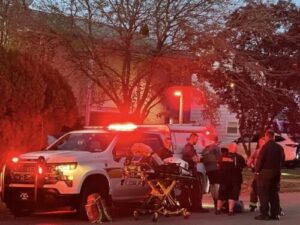Authorities in Dallas, Texas, have confirmed that Joshua Jahn, the man suspected in the deadly sniper-style shooting outside a U.S. Immigration and Customs Enforcement (ICE) facility, was found dead from a self-inflicted gunshot wound shortly after the attack.

The violent incident, which occurred earlier this week, has sparked widespread concern about domestic extremism and violence targeting federal agencies. The attack unfolded when Jahn, positioned at a distance from the federal facility, opened fire on the building and surrounding area.
Witnesses reported chaos as law enforcement officers rushed to the scene, securing the perimeter and evacuating nearby personnel. The motive behind the shooting became clearer as investigators discovered anti-ICE messages and writings scrawled on ammunition casings recovered at the scene — a disturbing indicator that the assault was ideologically motivated.
According to officials, Jahn acted alone and had been planning the attack for some time. Investigators are combing through his digital footprint, including social media posts, online forums, and possible connections to anti-government or extremist groups.
Early evidence suggests that Jahn harbored deep resentment toward federal immigration enforcement policies, which he blamed for systemic injustices. Authorities are now working to determine whether he had communicated with others or received support for his plans.
After the shooting, a manhunt was briefly launched, but law enforcement soon discovered Jahn deceased in a nearby area from what they confirmed to be a self-inflicted gunshot wound. Officials have emphasized that there is no ongoing threat to the public.
The FBI, ATF, and local police are conducting a joint investigation into the shooting. “This was a calculated and deliberate act of violence against a federal facility,” said a spokesperson for the FBI’s Dallas field office.
“We are working diligently to understand every aspect of the suspect’s planning, motives, and affiliations.” The attack has reignited conversations about domestic terrorism and politically motivated violence in the United States.
Law enforcement agencies have noted a concerning rise in targeted attacks against government facilities and personnel, often fueled by online radicalization and extremist ideologies. Security protocols at ICE facilities and other federal buildings across the country have since been heightened as a precaution.
Community leaders in Dallas have expressed both grief and outrage over the incident. “Violence is never a solution,” said one local advocacy group. “While people may disagree with government policies, resorting to terror and bloodshed only deepens divisions and causes more suffering.”
In the aftermath of the shooting, federal agencies have renewed calls for increased vigilance and cooperation between law enforcement and the public. Authorities are urging anyone with information about potential threats to contact them immediately.
Though many questions remain about Jahn’s background and the full scope of his intentions, the Dallas shooting serves as a stark reminder of the growing risks posed by domestic extremism.




